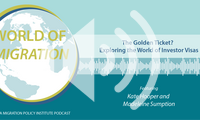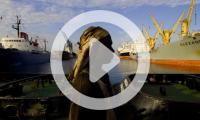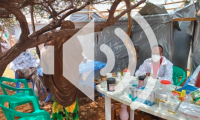
Kate Hooper
Senior Policy Analyst
Kate Hooper is a Senior Policy Analyst with MPI’s International Program, where she leads MPI’s global work on labor migration. Her areas of research include legal migration pathways, fair and ethical recruitment, the implications of remote work and other nontraditional working arrangements for immigrant selection systems, labor market integration, and complementary pathways for displaced populations.
Ms. Hooper has advised governments and intergovernmental organizations on legal migration pathways and opportunities to adapt immigration and immigrant integration policies to respond to emerging labor market trends. She had a part-time secondment to the United Nations Development Program, where she conducted an internal review of UNDP’s programming on return and sustainable reintegration.
|
Media Requests |
Ms. Hooper is the primary point person for the Transatlantic Council on Migration, MPI’s flagship international initiative that brings together senior policymakers, experts, and other stakeholders to discuss responses to pressing migration, protection, and immigrant integration issues.
She holds a master’s degree with honors from the University of Chicago’s Committee on International Relations, and a bachelor of the arts degree in history from the University of Oxford. She also holds a certificate in international political economy from the London School of Economics.
Bio Page Tabs
Marking the launch of MPI’s Global Skills and Talent Initiative, this webcast features senior policymakers and other experts discussing the extent to which labor market needs should shape future immigration policy decisions, and how countries are adjusting—and could adjust—their immigration systems to meet human capital and competitiveness needs.
Investor visa programs have become popular for countries seeking to attract foreign investment and stimulate economic growth. But how exactly do these programs work, and what are the potential benefits and drawbacks? MPI’s Kate Hooper speaks with Madeleine Sumption, the director of the Migration Observatory at the University of Oxford, about the range of investment visa programs, applicants’ motives, and more.
Held immediately after the European Union unveiled its skills and talent package, this MPI Europe webinar explores how Europe can address its labor market needs at a time of great upheaval, and the role that immigration and immigrant integration policy can play in helping propel Europe’s economic recovery.
On this webinar speakers discuss a recent policy brief Deepening Labor Migration Governance at a Time of Immobility: Lessons from Ghana and Senegal.
This conversation marks the release of an MPI policy brief and reflects on how mobility systems in sub-Saharan Africa have adapted to meet the public health challenges posed by COVID-19, and what lessons can be learned.



















Canada's New Tech Talent Strategy Takes Aim at High-Skilled Immigrants in the United States
Why the European Labor Market Integration of Displaced Ukrainians Is Defying Expectations
Labor Shortages during the Pandemic and Beyond: What Role Can Immigration Policy Play?
Achieving the “Partnership” in the European Union’s Talent Partnerships
A Race Against the Clock: Meeting Seasonal Labor Needs in the Age of COVID-19
The New EU Migration-Related Fund Masks Deeper Questions over Policy Aims